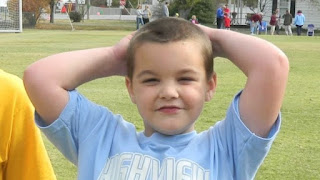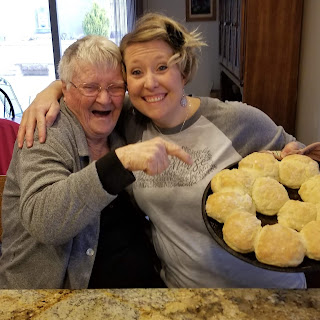OCD: Sharing My Intrusive Thoughts
For my friends and family who don’t know yet.
Two and a half months ago, I was diagnosed with OCD and
clinical depression, but I’m going to be okay.
Obsessive Compulsive Disorder is a commonly misunderstood
anxiety disorder that affects about 2% of the population. We all experience
something called “intrusive thoughts”. These are ideas that enter our
consciousness that we don’t invite and usually don’t like. When they occur,
most of us just dismiss them and move on. People with OCD have a glitch in their
brain that makes processing these thoughts rather difficult. Rather than moving
on, OCD-sufferers will internalize the thought and then use compulsions to try
to get rid of it. However, the compulsions just make the thought stronger. These
intrusive thoughts are ego-dystonic, meaning they are opposed to our natural
personality or character. Some of them can be rather mild and sometimes they
are incredibly distressing. If the compulsion is not performed, it causes major
anxiety. There is no win.
OCD comes in many
forms, but they all stem from the same basic problem in the brain. The kind
most people are more familiar with involves outward compulsions, like washing
hands or repeating movements. Another kind, often referred to as Pure-O (Pure-Obsessional) OCD is
less familiar to people. With Pure-O, most of the compulsions are mental, which
makes the OCD invisible. It involves compulsions like repeating phrases or
prayers, avoiding “magic” words, trying to solve the genesis of the thought,
reassurance, etc. “Pure-O” is a bit of a misnomer because while the compulsions
are not visible, they are certainly there. Many people, myself included, struggle with more than one form.
You can read a lot more about this online. Now I’ll tell you
a little of my story.
I had no idea I had OCD. I just thought I was an
over-thinking, over-emotional person. So the diagnosis was a shock. However, as
I have reflected over my life, it shouldn’t have been a surprise at all.
There were lots of little things. Tennis shoes for example.
I have to re-tie them constantly. When I was a child, it would take me
sometimes more than half an hour to put on my shoes. I stopped wearing mascara
for a long time because I couldn’t get my eyelashes to look the same on both
eyes. I had to part my hair on either side on rotating days. So I had a weird
thing with symmetry that has manifested itself in different ways throughout my
life. No big deal, I thought.
I have had deep spiritual issues that have been quite
distressing throughout my adult life. I have questioned the existence of
heaven, the goodness of God, the very existence of God. I have been convinced
that my husband wants to divorce me, just because he didn’t say “I love you”
before he fell asleep, for example. I constantly have to check things, like my
purse or my lists. I have had thoughts of driving my car off of overpasses. I
am fixated on aging and my own death, daily. When good things happen, it makes
me sad because the good thing will end. I could go on, but I’ll spare you.
Most of you reading this will have had several of these
thoughts, and that’s completely normal. The difference is that for me, the
thoughts will not leave. Before I was diagnosed, I spent hours each day dealing
with these thoughts. The more I tried to get rid of them, by repeating prayers
or ruminating, for example, the more the thought persisted and the more anxious
I became.
Dealing with all this has had some major consequences on my
emotional well-being. Years ago, right after my third son was born, I told my
obgyn that I was really sad. He said it was post-partum depression and put me
on birth control pills. That didn’t fix the problem. A few years ago, shortly
after we moved and after my grandmother passed away, I told my doctor that I
was dealing with emotional difficulties. She put me on Zoloft for a year. It
helped so much, but it did not address the underlying issue, so the sadness
came back.
Then this fall, things started to get really bad for me.
Dealing with thoughts of my own death hundreds of times each day was wearing on
me. Getting up to go to work became extremely difficult. Smiling and meaning it
became difficult. Everything upset me. I am not suicidal, but I could not
imagine that kind of existence much longer.
I went to a psychologist, rather reluctantly. I knew the
problem. It was obviously hormonal. It was probably left-over post-partum
depression. Of course I was wrong. After one meeting, the psychologist
confidently diagnosed me with OCD. I didn’t believe her at first. OCD is so
invasive, so all-consuming, such a deep part of how my brain works that I had
assumed my thought processes were normal. They are not.
She also diagnosed me with depression. This might surprise
people who are close to me. I am a generally happy person. I am positive,
cheerful, and optimistic. I am also a great pretender, I suppose. I exerted
great effort to be happy in front of people because I never wanted to distress
anyone else.
Now I am on Zoloft again. I am also seeing my therapist
regularly and engaging in daily exposure therapy at home. It is awful, quite
possibly the hardest thing I’ve ever had to do in my life. However, it is
working. So I will keep doing it.
Sam is being great through all of this. The day I was
diagnosed he said, “We just get to understand better how your brain works. And
we are still us.” I love him for that. He goes with me to every therapy session
and has done so much at home to make sure I’m okay. My boys have been great,
too. We told them the truth right away. Like typical children, they are fine
with it. My parents, in-laws, and sisters have been so kind and supportive. This
is just one more way my amazing family has shown me the incredible depth of
their love for me.
I told my students. I wrestled for a minute with that
decision. There is such stigma and misunderstanding around disorders like OCD,
I didn’t want to invite more stress for myself into my classroom. However, I
ultimately decided I preferred to just be up front with them. They have been
terrific and completely sympathetic. I am blessed continually by my students
and their big hearts.
Sam and I are relieved that now we know what is causing all
this distress and heartache. While there is not a cure, at least there is effective
treatment. There is reason to look forward to tomorrow and smile.
God will sustain my faith through this trial. He is faithful
and good. I cling to that truth and find joy in that promise.



Comments
Post a Comment